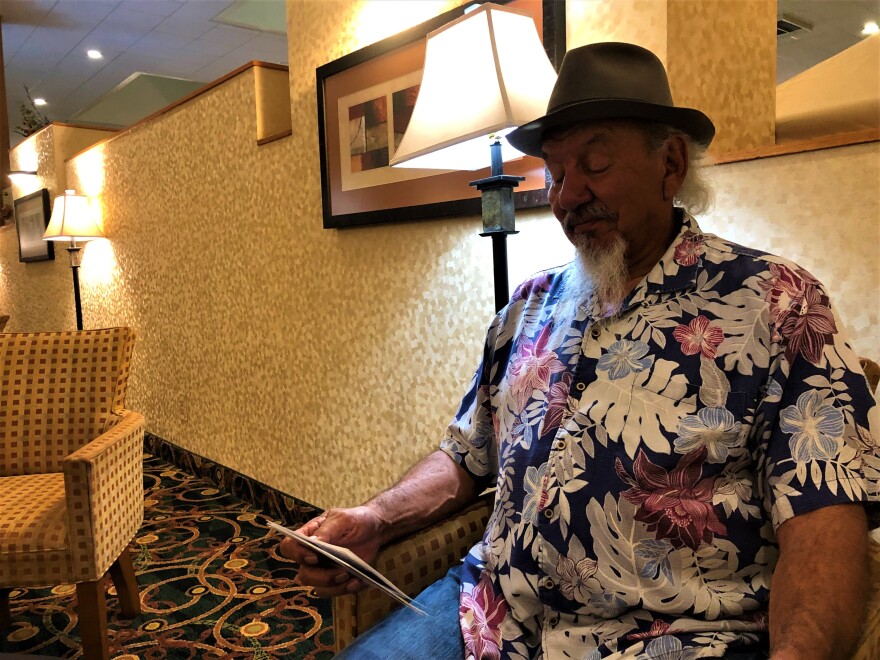Sergio Maldonado has been a classroom teacher, a college administrator, and a school board trustee. And as he's running for State Superintendent of Public Instruction, he's been substitute teaching for schools on the Wind River Reservation. Wyoming Public Radio's Taylar Stagner sat with Maldonado to talk about his thoughts on education in the state. They start off by discussing whether the K-12 system is underfunded.
Sergio Maldonado: Yes, I believe it's important that we fully fund our schools as per constitutional mandates, etc. But also what the legislative body has agreed to, they know that our schools need funding. That's the bottom line here. Now, does funding necessarily guarantee a level of success? Well, yes or no? Yes, it does. Because that delivery of education is in place.
And I'm reminded of the April spreadsheet of every one of our schools where we have schools that are doing fantastic, we have schools that are in the middle, we have schools who need a little bit more assistance.
But I will say that districts that may have marginalized communities with social issues that wreak havoc with a student's ability to learn, often do so.
Another question has come up about teachers. And I've said this many times before - on my webpage, I have it there - we have some of the best teachers in Wyoming. They're here because they want to be, they know the difficulty of our schools, our system. We only have 500,000 plus people. So we don't have what you would call the big city amenities that Chicago would have, Phoenix, Albuquerque, or any other place, Seattle.
I will say this, educating children, working with young people, is an energy consuming endeavor. But people who are in the education field do it because they love the profession.
There was a piece a while back, maybe two months ago, that said something just outrageous that 60 percent of our teachers, if they could leave Wyoming right now, they would. Well, that's what I call media hype. You know, I've talked to a lot of teachers in groups, and I put that out there, and everybody's shaking their head, no, they wouldn't get up and leave. If things were better, yes, it would be much more doable, not easier, but doable. But I do not believe in the media hype that 60 percent of our teachers will leave. They're here because they want to be. And I know we have good teachers.
Taylar Stagner: There's been some questions on tweaking the Hathaway scholarship, something fairly unique to Wyoming. I'm curious, do you have any thoughts about any tweaks that the program needs or any thoughts about the Hathaway program?
SM: First and foremost Hathaway scholarship has been around for what I'm gonna guesstimate 30 years, something like that. I know, both of our tribes have put significant dollars into it. It's my understanding, they're talking about not so much using the funds, but maybe making the requirements a little bit more rigid. I do not have a full picture on that. I say at this point of time, with my limited knowledge of [it] and I'm very aware of the Hathaway scholarship. Let's make the best of how it is being operated right now.
But one thing that I've learned in my time on this terra firma, is that when things have problems, one of the primary pieces are money. I would like to know, of all the dollars that the Hathaway and also the Wyoming Native American dollars, how many of the students once entered, how many of them completed? What is the success rate with those dollar amounts? To my knowledge, it's still pretty good.
When I was in high school, [there were?] dance shop programs, plumbing mechanics would work, electrical, even seamstress. I know right now that young people finish high school, or even at our Wind River Job Corps, they get some further training in these skills like a mechanic course in 15 months. My son went through that and they come out having completed it successfully and they're coming up pulling down $27 to $30 an hour, young people. What does a plumber go for nowadays, probably about $80 an hour? An electrician about 80 to $100 an hour? So we have to make available for our students those types of options that they can consider. And I know that not every student is going to take on the idea of 'Well, I think I'll go to a community college or university.' Some may not be emotionally ready for that. They may have the cognitive capacity to do so but they just may not be emotionally ready.
So we have to have those kinds of job skills, etc. available for our students in the high school. I support that.
TS: And the state says that there's a shortage of about 700 teachers, especially in rural areas. What are some solutions that you can suggest to help teachers and them being overwhelmed? Can technology help in any way?
SM: I agree with the notion that we are short on teachers. I could be booked on the reservation on every day of the week as a substitute with my teaching certification. Yes, we are short of teachers. As to 700 across the state. I don't know if that is the right number.
They have all these certified positions still open, it's not being filled, classified positions that are not being filled. We need bus drivers. You need to have a CDL and school bus training. But how do we recruit? How do we retain one more time? Wyoming is in a predicament in the sense that we have 500,000 people. We have beautiful cities, all overwhelming, but they're just not heavily populated. And that does not draw people to come to this neck of the woods, and want to plant plant roots. So it's just going to be something that we're gonna have to continue to work with. But in the meantime, let's make the best classroom work environment available for our existing staff.
TS: I guess how would you achieve that goal?
SM: One thing about Wyoming that I can say, as compared to other plates, places that across a nation where you have huge amounts of people, what happened a couple of months ago in Uvalde, Texas. I wept when I saw that that morning there were 14 students in all and the police were just standing around, not wanting to go in. And they are there to protect and to serve, while our teachers are there to protect and serve also.
So what do we do to make it better? Number one, we let students and parents know that we have safe environments. Bottom line, I think the second part is talking about statistical analysis, how you can manipulate the given variable, the nuisance variable, the variable that we can manipulate, and the one that is unknown. That's what is a part of Wyoming, it's the unknown variable. We have some solid cold winters, and not everybody's ready to put up with some of our winners. Yet my oldest daughter lives in Chicago, and they have cold, wet winters like ours. People have to be aware of this is what you're going to move into, do the best you can to embrace it.
Children who come to school who are not adequately fed that morning or the night before, we have children who are coming from homes that may be single parent, whether it's mom or dad or whatever. We have homes, I think of our reservation, that you have 15-20 people living in a 60 year old home. And so we have those social variables that teachers do their best, and I know they do, to address, accommodate and work with that child.
So we have some pieces here that are not so good. But on the flip side, our cup is not half empty. Our cup is half full. I'm not a detriment thinker. And so I believe a lot of teachers feel that way. We will work with a given situation and make the best of it. And we still have success.
TS: To put a bow on it, are you satisfied with education requirements in the state? And are there any changes that you make? And why would you make them?
SM: I can't say anything specifically. Once I become the superintendent, then we can look at those types of things. And I'm one of these positive progressive people that say 'Yes, this can happen.' And we are excited about the possibility of it happening. I'm from here. Somebody said a couple of months ago, I think of somebody from the reservation. He says, 'You know Serg when you stop and think about it, when you become the Superintendent of Public Instruction, you're Wyoming's Native Son.' I just kind of looked at him like 'Oh, geez. Okay."
But that's what it's about in Wyoming is the equality state. And yes, we can do it. Let's make the equality state not so much a noun, person, place or thing, but a verb. Let's show Wyoming and the whole nation that yes, we can pull it together under the direction of a Native Son, if I may, and lead in educational attainment and success.









